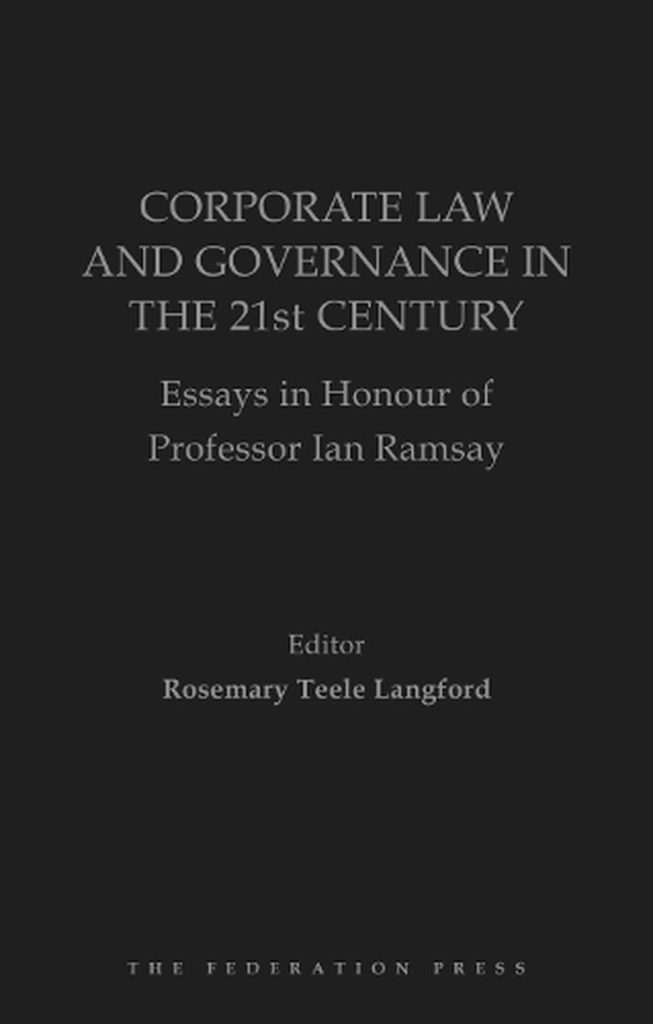Editor: Rosemary Langford
Publisher: The Federation Press
Reviewer: Dan Butler KC
Corporate Law and Governance in the 21st Century is a collection of essays in honour of Professor Ian Ramsay AO. Professor Ramsay is the Redmond Barry Distinguished Professor Emeritus at the University of Melbourne Law School. He has published extensively on corporate law and governance and contributed to the learning in this field for decades. This text, edited by Rosemary Langford, honours his contribution.
The text contains eleven essays by highly regarded authors. Each essay addresses important and topical issues in corporate law and governance. As the Honourable Pat Keane AC KC observes in his essay, “[c]orporations are now the principal vehicles of the global economy.” This serves to highlight the importance of research and critical thought in this area.
The topics addressed in the essays range from aspects of the doctrine in Salomon v Saloman; the liability of beneficiaries in insolvent commercial trusts; the history of corporate regulation and regulators in Australia; whether corporate and financial services legislation would be better served by focussing on normative standards of behaviour, rather than a series of complex sections, with complex exceptions; the obligation of directors to consider the interests of creditors in financially distressed companies; the role of directors as monitors in collective investment schemes; the failure of corporate law reform in Australia, focusing on the current state of reform and the reforms from the past 20 years; the importance of digital finance to ‘financial ecosystems,’ including how financial reforms from the GFC functioned during the pandemic; whether directors’ duties might include an obligation to use artificial intelligence; the challenge of using technological innovation, such as virtual shareholder meetings, to engage with the corporation; and issues in the area of consumer credit and financial hardship.
As noted in the introduction to the text, a number of themes emerge from the essays, namely, (1) the impact of environmental, social and governance issues on financial regulation, corporate governance and shareholders; (2) the statutory and general law duties of care and to act in good faith in the interests of the corporation; (3) the complexity of corporations law; (4) the impact of the pandemic on corporate law, governance and financial regulation; and (5) the impact of technology on financial regulation, corporate governance, consumer credit protection and ASIC’s regulatory strategies.
The Honourable Kenneth Hayne AC KC says in the foreword to the text that “All of the essays collected here will provoke further thought and reflection. And every one of the essays in this work can be seen to build upon or respond to issues which Ian Ramsay has thought about, written or spoken about during his long and distinguished career.”
Corporate Law and Governance in the 21st Century is indeed a thought provoking book and a fitting tribute to Professor Ramsay’s work and contribution to this field. It is available for $180 direct from the publisher.
Author: Dr Damien J Cremean
Publisher: The Federation Press
The Court’s admiralty jurisdiction is sometimes seen as exotic. Indeed, it is not often encountered by some practitioners. Yet it is an important jurisdiction that dates back centuries.
The fifth edition of Dr Cremean’s text ‘Admiralty Jurisdiction’ is an invaluable resource for anyone practising in the admiralty and maritime jurisdiction. It is a comprehensive, and well written, guide to admiralty law. Significantly, the scope of the task undertaken, and undertaken successfully, by the author in this text should not be understated. To explain that task – the first edition started as a book on Australian law, the second extended to New Zealand, while the third focused on Australia and New Zealand, but also took in Singapore and Hong Kong SAR China. The fourth edition added Malaysia. Ambitiously, the fifth edition now includes all of those jurisdictions but also addresses the law in the United Kingdom, South Africa, Canada and India. It comes some five years after the publication of the fourth edition.
In writing the foreword for the fifth edition, the Honourable Mr Justice Teare observed that the useful collation of law from a number of jurisdictions into one text allows potential development of the law by reference to experience from other shipping jurisdictions. This serves to highlight the value of Dr Cremean’s book.
The text is divided into five chapters. Chapter 1 provides an introduction to the admiralty jurisdiction, including its historical development as well as an overview of its operation. Chapter 2, importantly, discusses the Court’s jurisdiction to hear an admiralty proceeding, including the distinction between jurisdiction to hear a claim in rem (usually brought against a ship) and a claim in personam, being a claim against a person. As the author observes, the ability to proceed directly against a ship has been the distinguishing feature of admiralty jurisdiction for centuries.
Chapter 3 is long and detailed. It addresses the various types of admiralty claims, separating these into categories – proprietary maritime claims, general maritime claims and other admiralty claims. Helpfully, the author addresses each specific type of claim, such as loss or damage to cargo, towage, pilotage, port and harbour dues, levies, arbitral awards and claims for salvage, to name just a few. Potential admiralty defences are also identified. Chapter 4 addresses practice and procedure in the admiralty jurisdiction and chapter 5 concerns procedural rules, including such matters as service, appearance and arrest of a ship.
Chief Justice Allsop of the Federal Court described the fourth edition as “a beautifully crafted and comprehensive work, written by someone with command of his field.” The same is true of the fifth edition. Admiralty Jurisdiction is an excellent practitioner’s text and is available for $265 direct from the publisher.


